Academy For Career And Living Skills Native Pollinator And Sensory Garden

Located in the heart of the Bronx, New York is the Academy for Career and Living Skills, an extraordinary school for students with a wide range of severe and or multiple disabilities. Serving over 600 students from grades 6 to12, more than 200 of them participate in the school’s horticultural program.




There are several gardens on this campus, a blessing in an urban area where most schools are short on space for such things. Peter McCoy, teacher in the horticultural program, tells us about a new dedicated garden space that serves the multi-fold purpose of providing a space for learning and skill development, as well as a respite for experiencing a peaceful green space. The Quality Review writes the school developed an indoor/outdoor facility to educate students about healthy eating habits, issues concerning the environment, and developing essential work skills. In fact, their stated mission is “to provide hands-on learning opportunities in urban agriculture and sustainability.”
Many students attending school here have been diagnosed as being somewhere on the autism spectrum. Autistic students, among others, benefit greatly from the hands-on activities in the garden, as well as the great opportunities for developing social skills. Other students attending the school are non-verbal, using voice activated devices and software programmed onto their iPads. This helps them learn to identify the garden’s many vegetables, herbs and flowers. Overall, the students work with their teachers and staff, including Physical, Occupational and Speech Therapists, to develop their skills in planting, cultivating, harvesting and composting.
A Garden in the Bronx
The Academy for Career and Living Skills is a large school in New York’s Bronx borough. They are fortunate to have developed multiple garden tracts on the surrounding land. Peter McCoy is grateful for this much property, since other schools in the area have much more limited space. The Academy’s horticultural program dedicated a plot this year to pollinator and native plants, an area now known as the sensory garden. They have begun moving seedlings to transition them to the outer garden.
The horticultural committee of Peter McCoy, Paula Lucas and Orlean Sirio works behind the scenes to keep the garden program going. They identify classes and instructors whose students are interested in watering, planting and composting. During harvest season, they guide the students as they learn how to harvest various vegetables and herbs.
Any excess produce is sold to the community, an effort run by the students. The school opens up to parents and guardians for special events. Proceeds from the school’s plant and produce sales go back into the horticultural program’s budget.
Learning About the Garden
The Academy is an ungraded school system with students ranging from 14 to 21 in age. The majority are junior high and high school ages. Although it exists under New York’s school system the school is self-contained and is dedicated to special education for severe and multiple disabilities.
Gardening tips, videos, info and more delivered right to your inbox!
Sign up for the Gardening Know How newsletter today and receive a free download of our most popular eBook "How to Grow Delicious Tomatoes."
Before COVID, there were 650 students in attendance but, as of spring 2022, there are approximately 400. There’s also an impressive group of support staff and teachers, including physical therapy, speech therapy, counselors and teaching assistants. The school’s horticultural program aims to help students understand our ties to the earth and where our food comes from while cultivating a garden group class environment.
During off season the students attend their gardening lessons indoors. In late winter and spring they learn about seedlings and germination. The academy has a culinary teacher who formerly ran a farmer’s market and taught culinary lessons. During harvest months, she uses some garden produce and herbs for teaching and cooking. When there’s a plentiful harvest, like recent bumper crops of collard greens and basil, the school’s cafeteria makes use of the produce.
What is a Sensory Garden?
When we think about the five senses and the limitations some of these students live with, a sensory garden seems perfect for expanding their life experience. Peter McCoy talks about the scented leaf plants like rosemary, thyme, apple mint, peppermint, lemon balm, lavender and geraniums – just to name a few that can be pleasantly experienced with the olfactory senses. On the other hand, using marigolds, which don’t smell as sweet, makes it easy to understand how they repel pests in the garden.
Peter says they are experimenting with sensitive Touch-Me-Not plants, whose leaves fold in when they’re touched. Pleasant to the touch are soft and fuzzy plants like lambs’ ears. Plants like the mammoth sunflowers are visually fascinating, and spending time in the garden helps the students experience the cycles of nature and the roles of bees, bugs, birds, spiders and other organisms who take up residence there.
When we consider how special needs citizens were treated in the past, this school makes one believe in the beauty of human nature and compassion. Thank you, Dr. McCoy and colleagues.
Every year, Gardening Know How awards $1,000 to 20 different, hand-picked garden projects across the United States and Canada. If your community or school garden has a growing, unmet need for more soil, seeds, fertilizers, building materials, or even just help getting the word out about your program, we’re ready and willing to help you meet those needs. As community gardens and school gardening programs spring up all over, we’re happy to do our part to help. Click here to learn more about how to apply.
Interested in learning more about school or community gardens? Visit our Community Gardening for Everyone page today.

Caroline Bloomfield is Manager of Marketing Communications at Gardening Know How since 2019. A northwest native, she has resided and gardened in multiple zones in the U.S. and is currently at home in Eugene, Oregon. Writing and editing for various publications since 1998, her BA in American Studies from Southern Maine University includes an emphasis in English. She was raised in California by avid gardeners and continues to enjoy the natural world with an appreciation for the concepts of sustainability and organic care for the planet.
-
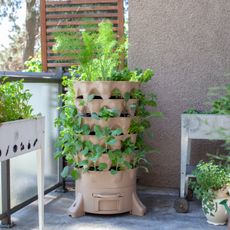 Clever Vertical Vegetable Garden Ideas For Small Spaces – 7 Ways To Save Space
Clever Vertical Vegetable Garden Ideas For Small Spaces – 7 Ways To Save SpaceShort on garden space? Learn some vegetable garden ideas for small spaces that are fun and easy.
By Mary Ellen Ellis
-
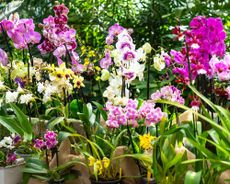 26 Different Types Of Orchids – With Pictures & Information
26 Different Types Of Orchids – With Pictures & InformationDiscover stunning orchid types to grow in your home and garden – from easy beginner varieties to rare and exotic species that are the preserve of experts.
By Melanie Griffiths
-
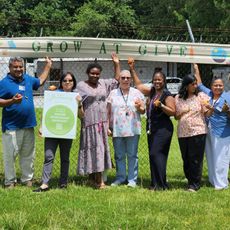 The Grow Garden at GIVE - 2022 Grant Recipient
The Grow Garden at GIVE - 2022 Grant RecipientThis alternative school in Georgia is using its garden to teach kids in all new ways.
By Caroline Bloomfield
-
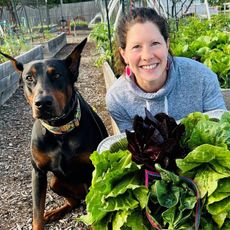 Common Ground Community Garden - 2022 Grant Recipient
Common Ground Community Garden - 2022 Grant RecipientThis Texas community garden has been getting people out of their apartments and into nature for 12 years.
By Caroline Bloomfield
-
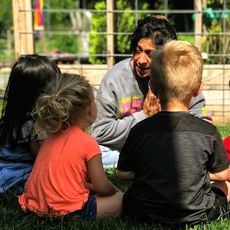 Valley Daycare - 2022 Grant Recipient
Valley Daycare - 2022 Grant RecipientBy Caroline Bloomfield
-
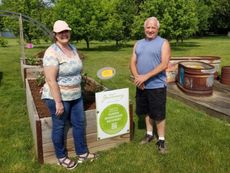 Douglas Discovery Garden – 2022 Grant Recipient
Douglas Discovery Garden – 2022 Grant RecipientBy Caroline Bloomfield
-
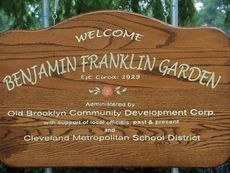 Ben Franklin Elementary School – 2022 Grant Recipient
Ben Franklin Elementary School – 2022 Grant RecipientThis hundred year old garden in Cleveland, Ohio is still going strong with a unique educational program for fourth graders.
By Caroline Bloomfield
-
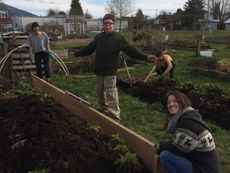 Kin Park Community Garden - 2022 Grant Recipient
Kin Park Community Garden - 2022 Grant RecipientRead about the small town in Vancouver that's bringing its people together with fresh produce and garden plots.
By Caroline Bloomfield
-
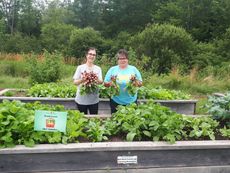 Elmsdale Community Garden – 2022 Grant Recipient
Elmsdale Community Garden – 2022 Grant RecipientThe Elmsdale Community Garden is striving to bring food security to rural Nova Scotia, one garden bed at a time. Read their story here.
By Caroline Bloomfield
-
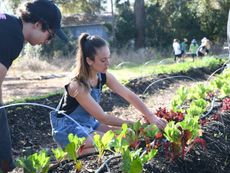 Gainesville Giving Garden - 2022 Grant Recipient
Gainesville Giving Garden - 2022 Grant RecipientThe Gainesville Giving Garden was born from a dream of freedom from food insecurity during the height of covid. Read its story here.
By Caroline Bloomfield